Bobby Clarke facts for kids
Quick facts for kids Bobby ClarkeOC |
||||||||||||||||||||||
|---|---|---|---|---|---|---|---|---|---|---|---|---|---|---|---|---|---|---|---|---|---|---|
| Hockey Hall of Fame, 1987 | ||||||||||||||||||||||
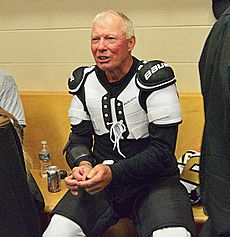
Clarke in 2017
|
||||||||||||||||||||||
| Born | August 13, 1949 Flin Flon, Manitoba, Canada |
|||||||||||||||||||||
| Height | 5 ft 10 in (178 cm) | |||||||||||||||||||||
| Weight | 176 lb (80 kg; 12 st 8 lb) | |||||||||||||||||||||
| Position | Centre | |||||||||||||||||||||
| Shot | Left | |||||||||||||||||||||
| Played for | Philadelphia Flyers | |||||||||||||||||||||
| National team | ||||||||||||||||||||||
| NHL Draft | 17th overall, 1969 Philadelphia Flyers |
|||||||||||||||||||||
| Playing career | 1969–1984 | |||||||||||||||||||||
|
Medal record
|
||||||||||||||||||||||
Robert Earle Clarke is a famous Canadian ice hockey player. He was a centre and played his entire 15-year career in the National Hockey League (NHL) with the Philadelphia Flyers. People called him Bobby Clarke when he played. After he retired, he became an executive for the team.
Many people think Bobby Clarke is one of the greatest hockey players and captains ever. He was the captain of the Flyers from 1973 to 1979. During this time, he helped them win the Stanley Cup twice, in 1974 and 1975. He was also captain again from 1982 to 1984.
Clarke won the Hart Memorial Trophy three times. This award is given to the league's most valuable player. In 1987, he was added to the Hockey Hall of Fame. In 2017, he was named one of the '100 Greatest NHL Players' in history.
Bobby Clarke had three seasons where he scored over 100 points. He led the league in assists twice. He was also chosen to play in nine NHL All-Star Games. In 1983, he won the Frank J. Selke Trophy. This award goes to the best defensive forward in the league.
After retiring in 1984, he became the general manager of the Flyers. He spent 19 seasons as a general manager for the Flyers. He also worked for the Minnesota North Stars and Florida Panthers. As a general manager, he led his teams to the Stanley Cup Finals four times. Today, he is the Flyers' senior vice president.
A famous photo shows Clarke smiling without a tooth, holding the Stanley Cup. This was after the Flyers won in 1975. It is one of the most famous pictures in hockey history.
Contents
Growing Up and Starting Hockey
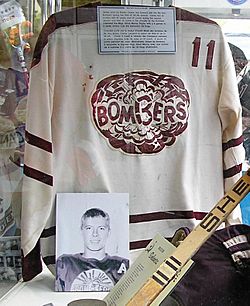
Bobby Clarke was born in a small mining town in Canada called Flin Flon. He started playing organized hockey when he was eight years old. When he was about 12 or 13, he found out he had type 1 diabetes.
Even with diabetes, he became a very good player for the Flin Flon Bombers. He led his junior league in scoring for three years. But NHL teams worried his diabetes would stop him from playing professionally.
His coach, Pat Ginnell, took Clarke to the Mayo Clinic in Minnesota. Doctors there said he could play professionally if he took care of himself. Ginnell showed this doctor's note to NHL scouts.
Despite this, Clarke was picked later than expected in the 1969 NHL Amateur Draft. The Philadelphia Flyers chose him 17th overall in the second round. Other teams wanted to trade for him right away, but the Flyers kept him. They knew he was a special player.
Bobby Clarke's NHL Career
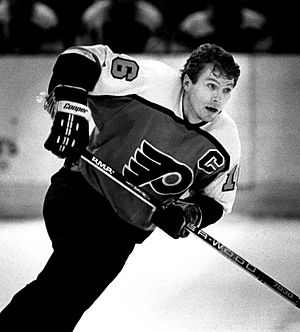
Bobby Clarke wore jersey number 16. He played his first NHL game on October 11, 1969. He got his first point, an assist, on October 22. His first goal came on October 30.
In his first season, he played all 76 games. He scored 46 points (15 goals, 31 assists). He was also chosen for the NHL All-Star Game. The Sporting News named him NHL Rookie of the Year.
In his second season (1970–71), Clarke led the Flyers in scoring. He had 27 goals and 36 assists for 63 points. His team made the playoffs, but they lost in four games.
Clarke had a slow start in the 1971–72 season. He was underweight because of a tooth infection. But he bounced back, scoring 30 goals and 35 assists in the rest of the season. He won the Bill Masterton Memorial Trophy for his dedication. The Flyers then signed him to a big contract.
Becoming a Captain and Winning the Stanley Cup
After playing well for Team Canada in the 1972 Summit Series, Clarke became the Flyers' captain. He was only 23, the youngest captain in NHL history at that time.
As captain of the "Broad Street Bullies," Clarke was the first player from an expansion team to score over 100 points. He had 104 points (37 goals, 67 assists) in the 1972–73 season. He won the Hart Memorial Trophy as the league's MVP. He also won the Lester B. Pearson Award, voted by the players.
In the 1973–74 season, Clarke's points dropped to 87. But his leadership and Bernie Parent's great goaltending helped the Flyers. They reached the Stanley Cup Finals against the Boston Bruins. Clarke scored a huge overtime goal in Game 2. The Flyers won the series and became the first expansion team to win the Stanley Cup. Clarke was key in stopping the Bruins' star players.
Clarke set an NHL record for assists by a center in 1974–75 with 89. He had 116 points that season. The Flyers won the Stanley Cup again, beating the Buffalo Sabres. Clarke won his second Hart Trophy and was named to the NHL First All-Star Team.
Record-Breaking Seasons and Later Career
1975–76 was a record year for Clarke. He played on a line with Reggie Leach and Bill Barber. They scored 141 goals together, a record for a line. Clarke tied his assist record with 89 and set a personal best of 119 points. He also led the league in plus-minus rating. The Flyers made it to the Finals again but lost to the Montreal Canadiens. Clarke won his third Hart Trophy.
His point totals went down in the next few seasons. But the Flyers remained strong, reaching the semifinals in 1977 and 1978.
In 1979, Clarke became an assistant coach while still playing. The Flyers then had an amazing 35-game undefeated streak. This was the longest in NHL history. They reached the Stanley Cup Finals but lost to the New York Islanders. Clarke won the Lester Patrick Trophy after the playoffs.
Clarke wore number 16 for almost his entire career. In 1981, his jersey was stolen, and he had to wear number 36 for two games. Later that season, he reached 1,000 career points. He scored a goal against the Boston Bruins after being hit by a shot and getting stitches.
Clarke was very tough despite his diabetes. He rarely missed games. In 1982, he became captain again. He had a great season in 1982–83, scoring 85 points. He also won the Frank J. Selke Trophy as the best defensive forward.
On May 15, 1984, Bobby Clarke retired from playing. He immediately became the general manager of the Flyers. On January 14, 2017, Clarke played in his last alumni game for the Flyers. He played with Bill Barber and Reggie Leach in front of a huge crowd.
Playing for Team Canada
Bobby Clarke played for Team Canada three times.
- In 1972, he helped Canada beat the Soviet Union in the Summit Series.
- In 1976, he was captain when Canada won gold at the 1976 Canada Cup.
- In 1982, he won a bronze medal at the World Championships.
He also led the Flyers to a win over the Soviet Red Army team in 1976. After his playing career, he helped manage Team Canada for the 1987 and 1991 Canada Cups. He was also the general manager for Canada at the 1998 Winter Olympics.
Summit Series Highlights
Clarke was the last player picked for Team Canada in the 1972 Summit Series. His line with Ron Ellis and Paul Henderson was Canada's best. Clarke scored two goals and four assists. He was named Team Canada MVP in Game 1.
Many people respected Clarke's play. He was in great shape, unlike some other players. In Game 6, Clarke had a strong hit on Soviet star Valeri Kharlamov's ankle. Kharlamov missed the next game and was not as effective after that. Clarke later said he learned to play tough.
Nagano Olympics Management
In 1997, Clarke became the general manager for Team Canada at the 1998 Winter Olympics. This was the first time NHL players competed in the Olympics. Some of his player choices were surprising. He picked Eric Lindros as captain over older stars like Wayne Gretzky. Team Canada played well but lost in the semifinals to the Czech Republic. They then lost the bronze medal game to Finland.
NHL Management Career
After retiring as a player, Clarke became the Flyers' general manager. His first time in this role lasted six seasons. The Flyers reached the Stanley Cup Finals twice, in 1985 and 1987. After missing the playoffs in 1990, he was fired.
Clarke then worked for the Minnesota North Stars for two seasons. They made a surprise run to the Finals in 1991.
He returned to Philadelphia as Senior Vice President in 1992. Then he became general manager for the new Florida Panthers team. They set a record for wins and points for an expansion team in 1993–94.
Clarke came back to the Flyers as general manager in 1994. He rebuilt the team into a strong contender. During his second time as GM, the Flyers made the playoffs for 11 seasons in a row. They reached the Finals once in 1997. He resigned in 2006, saying he felt burned out. He returned to the Flyers as Senior Vice President in December 2006.
Disagreements with Eric Lindros
One of the most talked-about parts of Clarke's time as general manager was his disagreements with star player Eric Lindros. The issues started when Lindros was negotiating a new contract.
Lindros had several concussions during the 1999–2000 season. He criticized the team's trainer. Because of this, Clarke took away Lindros's captaincy. After another concussion, Lindros never played for the Flyers again. He wanted to be traded to Toronto, but that deal didn't happen.
Clarke finally traded Lindros to the New York Rangers in 2001. Years later, after Lindros retired, Clarke said Lindros deserved to be in the Hockey Hall of Fame. He said Lindros was an "outstanding, dominant" player.
In 2011, both Lindros and Clarke played in an alumni game for the Flyers. This game helped them to move past their disagreements.
Personal Life
Bobby Clarke and his family have lived in South Jersey for a long time. They have lived in several towns there.
Clarke and his wife, Sandy, have four children: sons Wade and Lucas, and daughters Jody and Jakki. They live in Ocean City, New Jersey.
Career Statistics
Regular season and playoffs
| Regular season | Playoffs | |||||||||||||
|---|---|---|---|---|---|---|---|---|---|---|---|---|---|---|
| Season | Team | League | GP | G | A | Pts | PIM | GP | G | A | Pts | PIM | ||
| 1965–66 | Flin Flon Bombers | SJHL | 4 | 4 | 3 | 7 | 0 | — | — | — | — | — | ||
| 1966–67 | Flin Flon Bombers | MJHL | 45 | 71 | 112 | 183 | 123 | 14 | 10 | 18 | 28 | 51 | ||
| 1966–67 | Flin Flon Bombers | M-Cup | — | — | — | — | — | 6 | 2 | 5 | 7 | 49 | ||
| 1967–68 | Flin Flon Bombers | WCHL | 59 | 51 | 117 | 168 | 148 | 15 | 4 | 10 | 14 | 2 | ||
| 1968–69 | Flin Flon Bombers | WCHL | 58 | 51 | 86 | 137 | 123 | 18 | 9 | 16 | 25 | 0 | ||
| 1969–70 | Philadelphia Flyers | NHL | 76 | 15 | 31 | 46 | 68 | — | — | — | — | — | ||
| 1970–71 | Philadelphia Flyers | NHL | 77 | 27 | 36 | 63 | 78 | 4 | 0 | 0 | 0 | 2 | ||
| 1971–72 | Philadelphia Flyers | NHL | 78 | 35 | 46 | 81 | 87 | — | — | — | — | — | ||
| 1972–73 | Philadelphia Flyers | NHL | 78 | 37 | 67 | 104 | 80 | 11 | 2 | 6 | 8 | 6 | ||
| 1973–74 | Philadelphia Flyers | NHL | 77 | 35 | 52 | 87 | 113 | 17 | 5 | 11 | 16 | 42 | ||
| 1974–75 | Philadelphia Flyers | NHL | 80 | 27 | 89 | 116 | 125 | 17 | 4 | 12 | 16 | 16 | ||
| 1975–76 | Philadelphia Flyers | NHL | 76 | 30 | 89 | 119 | 136 | 16 | 2 | 14 | 16 | 28 | ||
| 1976–77 | Philadelphia Flyers | NHL | 80 | 27 | 63 | 90 | 71 | 10 | 5 | 5 | 10 | 8 | ||
| 1977–78 | Philadelphia Flyers | NHL | 71 | 21 | 68 | 89 | 83 | 12 | 4 | 7 | 11 | 8 | ||
| 1978–79 | Philadelphia Flyers | NHL | 80 | 16 | 57 | 73 | 68 | 8 | 2 | 4 | 6 | 8 | ||
| 1979–80 | Philadelphia Flyers | NHL | 76 | 12 | 57 | 69 | 65 | 19 | 8 | 12 | 20 | 16 | ||
| 1980–81 | Philadelphia Flyers | NHL | 80 | 19 | 46 | 65 | 140 | 12 | 3 | 3 | 6 | 6 | ||
| 1981–82 | Philadelphia Flyers | NHL | 62 | 17 | 46 | 63 | 154 | 4 | 4 | 2 | 6 | 4 | ||
| 1982–83 | Philadelphia Flyers | NHL | 80 | 23 | 62 | 85 | 115 | 3 | 1 | 0 | 1 | 2 | ||
| 1983–84 | Philadelphia Flyers | NHL | 73 | 17 | 43 | 60 | 70 | 3 | 2 | 1 | 3 | 6 | ||
| NHL totals | 1,144 | 358 | 852 | 1,210 | 1,453 | 136 | 42 | 77 | 119 | 152 | ||||
International
| Year | Team | Event | GP | G | A | Pts | PIM | |
|---|---|---|---|---|---|---|---|---|
| 1972 | Canada | Summit-72 | 8 | 2 | 4 | 6 | 18 | |
| 1976 | Canada | Can-Cup | 6 | 1 | 2 | 3 | 0 | |
| 1979 | NHL All-Stars | Ch-Cup | 3 | 0 | 1 | 1 | 0 | |
| 1982 | Canada | WC | 9 | 0 | 1 | 1 | 6 | |
| Senior int'l totals | 26 | 3 | 8 | 11 | 24 | |||
All-Star Games
| Year | Location | GP | G | A | P | |
|---|---|---|---|---|---|---|
| 1970 | St. Louis Arena | 0 | 0 | 0 | ||
| 1971 | Boston Garden | 0 | 0 | 0 | ||
| 1972 | Metropolitan Sports Center | 0 | 0 | 0 | ||
| 1973 | Madison Square Garden | 0 | 1 | 1 | ||
| 1974 | Chicago Stadium | 0 | 1 | 1 | ||
| 1975 | Montreal Forum | 0 | 0 | 0 | ||
| 1976 | Spectrum | DNP | — | — | — | |
| 1977 | Pacific Coliseum | 0 | 0 | 0 | ||
| 1978 | Buffalo Memorial Auditorium | 0 | 1 | 1 | ||
| All-Star totals | 8 | 0 | 3 | 3 | ||
Bobby Clarke's Legacy
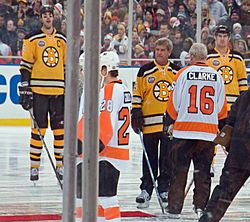
On November 15, 1984, the Flyers held "Bobby Clarke Night." They retired his number 16 jersey. They also created the Bobby Clarke Trophy. This award is given every year to the Flyers' Most Valuable Player.
Three years later, Clarke was inducted into the Hockey Hall of Fame on his first try. In 1988, the Flyers started their own team Hall of Fame. Bobby Clarke and Bernie Parent were the first two players inducted.
Clarke was also made an Officer of the Order of Canada. The trophy given to the top scorer in the Western Hockey League was renamed the Bob Clarke Trophy. He has been inducted into several other halls of fame, including:
- The Philadelphia Sports Hall of Fame (2003)
- Canada's Sports Hall of Fame (2005)
- The Manitoba Hockey Hall of Fame
Records Held by Bobby Clarke
Clarke finished his playing career with many impressive records. He was 4th all-time in assists and 11th all-time in points. As of 2025, he is 25th all-time in assists and 46th all-time in points. His career plus-minus of +507 is 5th all-time.
He still holds several Philadelphia Flyers records, including:
|
|
Awards and Honors
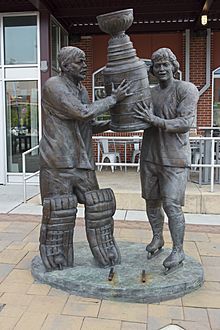
| Award | Year(s) |
|---|---|
| Bill Masterton Memorial Trophy | 1972 |
| Brownridge Trophy | 1968, 1969 |
| Class Guy Award (Philadelphia Flyers team award) | 1982 |
| Frank J. Selke Trophy | 1983 |
| Hart Memorial Trophy | 1973, 1975, 1976 |
| Lester B. Pearson Award | 1973 |
| Lester Patrick Trophy | 1980 |
| Lionel Conacher Award | 1975 |
| Lou Marsh Trophy | 1975 |
| NHL All-Star Game | 1970, 1971, 1972, 1973, 1974, 1975, 1977, 1978 |
| NHL First All-Star Team | 1975, 1976 |
| NHL Second All-Star Team | 1973, 1974 |
| Stanley Cup champion | 1974, 1975 |
| WCHL MVP | 1969 |
| WCHL All-Star Team | 1969 |
| WCJHL First All-Star Team | 1968 |
See also
- List of NHL statistical leaders
- List of NHL players who spent their entire career with one franchise
 | John T. Biggers |
 | Thomas Blackshear |
 | Mark Bradford |
 | Beverly Buchanan |

